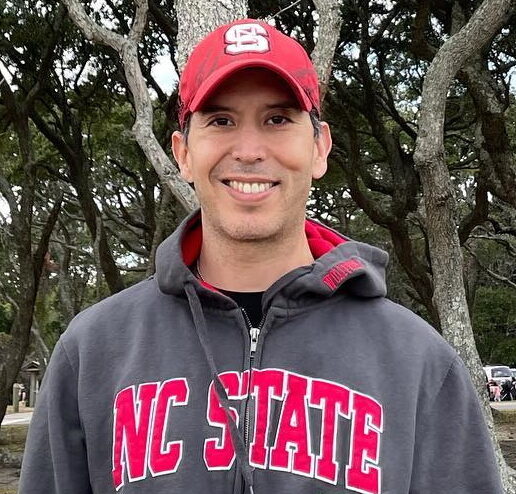Robert Mera

Bio
Robert Mera is the Program Coordinator and Lecturer for the Climate Change and Society MS and Climate Adaptation Certificate for the MEAS Department. He earned his Bachelor’s in atmospheric science at UNC-Asheville (2003) and MS (2006) and PhD (2010) at NC State. During his time at NC State he also had an internship with the Asheville Graduate School in 2008 for the creation of an MS in Climate Change and Society, as well as a research assistantship with the Nyogi Land Surface Research Lab at Purdue University 2006-2008. He was a postdoc scholar for UCAR based at Oregon State University 2010-2013 and a Kendall Science Fellow at the Union of Concerned Scientists 2013-2015. During his PhD his research was involved in the intersection of health and West African climate. His work during his postdoc at OSU was on climate attribution and during his Fellowship at UCS his work focused on analyzing specific carbon emissions to determine how they are affecting global temperatures and extreme heat events.
SHORT DESCRIPTION OF INTERESTS:
I am thrilled to be a part of the Coastal Resilience and Sustainability Initiative and collaborate in interdisciplinary research for our students in the Climate Change and Society program as well as to be a source of information for the initiative going forward.
Publications
- The rise in global atmospheric CO2, surface temperature, and sea level from emissions traced to major carbon producers , CLIMATIC CHANGE (2017)
- Attribution of trends in rising nighttime temperatures in the Western US , (2015)
- Climate change, climate justice and the application of probabilistic event attribution to summer heat extremes in the California Central Valley , Climatic Change (2015)
- Evaluation of a Regional Climate Modeling Effort for the Western United States Using a Superensemble from Weather@home* , Journal of Climate (2015)
- Superensemble Regional Climate Modeling for the Western United States , Bulletin of the American Meteorological Society (2015)
- Attribution of Extreme Temperature Events for the Western US using a superensemble of Regional Climate Model Simulations , (2014)
- Attribution of low precipitation in California during the winter of 2013-2014 , (2014)
- Moisture Variability and Multiscale Interactions during Spring in West Africa , Monthly Weather Review (2014)
- Using Weather Forecasts to Help Manage Meningitis in the West African Sahel , Bulletin of the American Meteorological Society (2014)
- Attributing Rise in Global Average Temperature to Emissions Traceable to Major Industrial Carbon Producer , (2013)
Grants
To ensure gender parity for women in climate change and environmental sciences in Pakistan, NC State University proposes to partner with the Lahore College for Women University (LCWU), and two collaborative institutions (Fatima Jinnah Women University- FJWU and SBK Women's University- SBKWU), to develop Pakistani capacity, particularly for women scientists and students, to adapt to and mitigate climate and associated environmental changes. In this proposal,we will initiate a monthly Climate and Environmental Change Women Speaker Webinar series. Each year, 9 US scientists (6-7 are female) will visit LCWU/FJWU to give seminars, field courses, training workshops, and climate and associate environmental change forums. Correspondingly, every year, we will host 10 Pakistani women faculty, students, and policy makers for 30 days to have a field course at NC Outer Banks, on-campus workshop, training seminars, and interacting with female colleagues at NC Climate Office, Institute for Climate Studies, Center for Geospatial Analytics, and Southeast Climate Adaptation Science Center. This grant will provide a great opportunity for the Pakistani women universities to learn from NC State, particularly in terms of how to train and boost women in environmental science fields. Those opportunities would help Pakistani women universities to reevaluate their current environmental major teaching and research programs, and strengthen each other���s curriculum development, and increase collaborative research, virtual teaching exchanges, sharing of pedagogical resources, professional development for women faculty, and faculty-and-student exchanges.